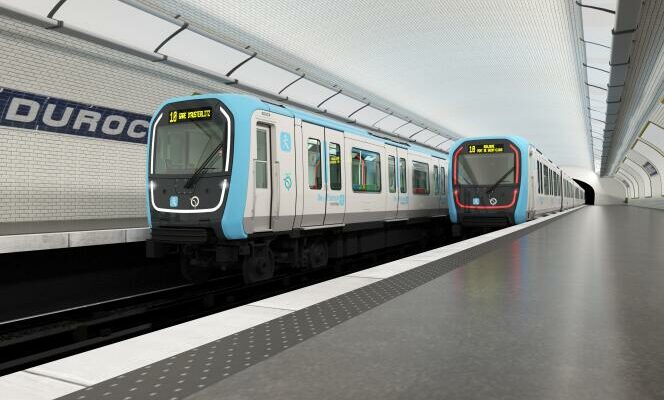The Ile-de-France region gave its agreement, Wednesday February 7, to a giant order for 103 new metro trains from Alstom, which will be delivered within three to five years to modernize the network.
The aim of this order is to replace the trains of line 13 which is overloaded and promised to be automated, and part of those of lines 8 and 12, whose poor performance penalizes users and the numerous tourists visiting the capital. The amount of “nearly 1.1 billion current euros excluding taxes” entirely financed by Ile-de-France Mobilités (IDFM), this order is a sign of“a transport revolution that continues”declared to Agence France-Presse (AFP) Valérie Pécresse, president of the regional transport authority and the Ile-de-France region.
IDFM aims to renew “all metros by 2032”, she recalled. Former Prime Minister Jean Castex, CEO of the Régie Autonome des Transports Parisiens (RATP) since the end of 2022, had welcomed in advance at the end of January the purchase of new MF19 metros, but regretted a decision “taken twenty years late”.
Voted on Tuesday by the IDFM board of directors, this important order “testifies to IDFM’s renewed confidence in this new generation equipment”rejoiced the French manufacturer Alstom to AFP. “This new order aims to enable Alstom to secure its supply chains while adapting to the progress of the necessary infrastructure work on the lines”, added IDFM in its press release. The French railway giant, which is seeking to get out of debt, already has a full order book “over the next three years”.
Obsolete trains and repeated delays
Criticized for the repeated delays that users encounter along its route, due in particular to recruitment problems, the Paris metro network also suffers from outdated equipment.
The new “MF19” standard trainsets will replace trainsets for which calls for tenders sometimes date back to 1967, 1977 or 1988. This new rolling stock should also relieve the RATP maintenance workshops, agitated in recent months by movements strike due to overwork of agents.
The MF19, which Ile-de-France Mobilités describes as “modern”, “comfortable” and having a significant capacity, will be available in several lengths depending on the needs of the lines concerned. They will be able to switch from manual to automatic driving. A strong point since RATP is continuing the automation of certain lines: after line 4 recently automated in January, it will be the turn of line 13 by 2030.
10 billion euros of investment by 2035
It is now up to RATP to formalize the order without delay. Ile-de-France Mobilités requested “up to RATP to order these trainsets as soon as possible and to respect delivery and commissioning schedules”according to its press release.
Le Monde Buying Guides
Reusable water bottles
The best water bottles to replace disposable bottles
Read
The 103 trainsets will be assembled in Alstom factories in Crespin and Valenciennes Petite-Forêt, in the North. “An order to complete lines 8 and 12, as well as lines 3 and 7, will come soon”added Ile-de-France Mobilités in its press release.
In total, all of these new trains will run on eight metro lines (3, 3bis, 7, 7bis, 8, 10, 12 and 13). “Their arrival, planned for 2025 on line 10, is part of a general policy of acceleration and modernization of the metro network”writes IDFM. “This policy has made it possible to initiate unprecedented investments, amounting to nearly 10 billion euros by 2035”adds the institution.
The order voted on Tuesday is larger than the previous one, in 2019, when Ile-de-France Mobilités and RATP signed a contract for 44 trainsets for lines 10, 3bis and 7bis of the Parisian network, distributed at the time by half between the manufacturers Alstom and Bombardier. Alstom has since bought Bombardier, and is now the sole supplier.
